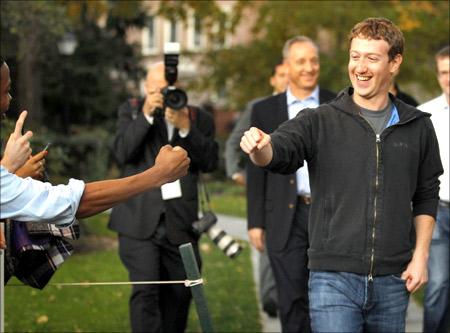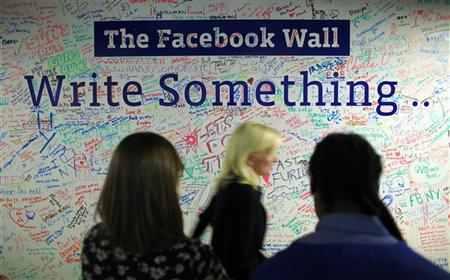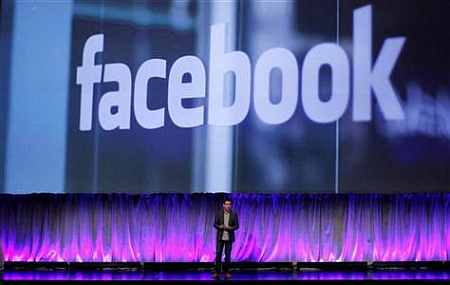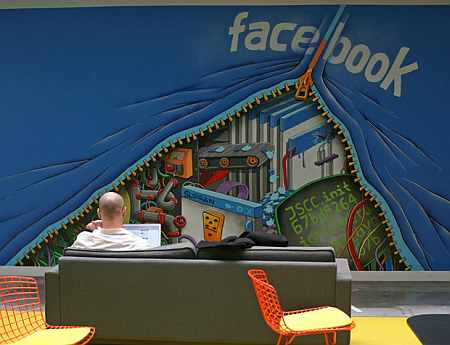Photographs: Brian Snyder/Reuters Business Standard
There are considerable implications for corporate governance in the structure of the initial public offering of Facebook.
The equity of the eight-year-old social media platform is divided into Class A and Class B shares.
Class A shares control one vote each, while Class B shares control 10 votes each.
A Class B share sold to the general public is transformed into a Class A share.
This enables the founders, who own Class B shares, to keep control -- while raising large sums without debt service obligations.
Mark Zuckerberg will control over 57 per cent of voting rights while owning about 28 per cent of Class B equity.
. . .
What are the implications of Facebook's IPO
Image: Zuckerberg's desk.Photographs: Reuters
Further dilutions by Class B shareholders may actually lead to greater concentration of voting control as the sold shares convert to Class A.
This is an unusual twist.
Shareholdings divided in binary, non-transformable fashion into voting and non-voting classes are common enough.
In such cases, the voting shares usually trade at a premium -- as with Tata Motors, to take an Indian example.
The valuation paradigm changes in a structure akin to Facebook, since a trade transforms a Class B share into a Class A share.
. . .
What are the implications of Facebook's IPO
Image: An illustration picture shows a woman looking at the Facebook website on a computer in Munich.Photographs: Michael Dalder/Reuters
A market for off-exchange transfers without transformations of shares via proxies or power-of-attorney agreements may develop if such structures become popular.
Of course, it is a moot point if anybody should become a minority shareholder in such a structure -- one would need to have absolute confidence in management.
There are arguments, for and against.
Management may deliver better shareholder value if it is more decisive and, hence, strategically effective.
On the other hand, the effective elimination of shareholder activism may also have a very deleterious effect on governance.
. . .
What are the implications of Facebook's IPO
Photographs: Eduardo Munoz/Reuters
The Indian government may wish to seriously consider such structures in public sector undertakings in order to accelerate the disinvestment programme.
This could allow it to sell larger chunks without fear of losing control, thereby short-circuiting the usual arguments raised by the Left.
Apart from structural implications, the IPO valuation is very rich.
The network has 900 million-odd users, with 525 million logging on daily.
About 488 million use mobile devices.
Facebook had $3.7 billion in revenues in 2011.
. . .
What are the implications of Facebook's IPO
Image: Facebook Vice President of Product Chris Cox.Photographs: Mike Segar/Reuters
The sale of 337.4 million shares raises between $9.5 billion and $11.8 billion, at a price band of $28-$35.
This is a market valuation of between $77 billion and $96 billion.
Seen another way, each current Facebook user is valued at between $85 and $105.
The average revenue per user, or ARPU, is about $3.5.
To justify such valuations, it could be argued that the user-base and the ARPU would need to grow at a compounded rate of at least 20 per cent per annum for the next decade.
One key revenue stream is advertising, which contributed over 80 per cent of 2011 revenues.
. . .
What are the implications of Facebook's IPO
Photographs: Robert Galbraith/Reuters
Advertising is growing at less than five per cent compounded annual growth rate and so Facebook must wrest major market share -- especially in the mobile segment, where it has very little advertising.
It will also have to leverage its 'Credits' system, a form of virtual money, to sell services and products directly onsite.
This is uncharted territory, especially at such a scale.
Whether it succeeds or fails, Facebook will provide rich grist to the mills of management theory over the next few years.








article